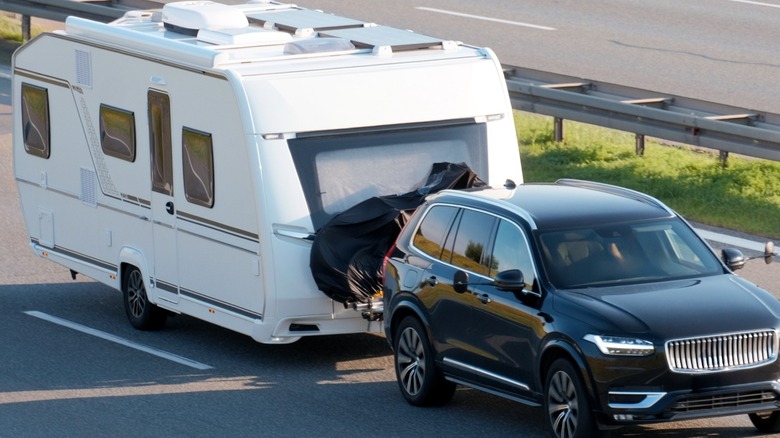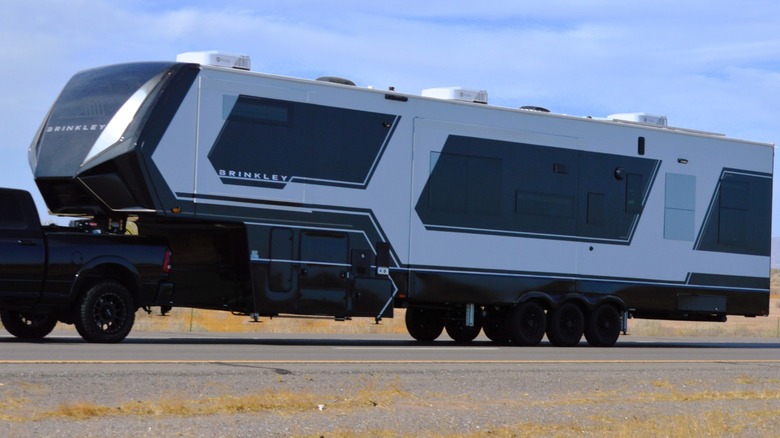
Who wants to be riding for eight hours in the backseat of a pickup when you could be kicking back in the RV trailer behind it, especially considering how fancy some travel trailers are getting? We have a feeling you wouldn't be asking that if you had ever tried riding in a travel trailer. It's not the safest feeling, and it's pretty easy to get knocked around, especially on sharp curves or bumpy terrain.
Still, some people like to live dangerously. And, like many risky things you can do with a vehicle, riding in a towed RV, such as a travel trailer or 5th wheel, is illegal in some states. About 34 states, like Alabama, New York, and Wyoming, prohibit riding in a moving RV trailer. But eight of those states, like California and South Dakota, allow riding in 5th wheels, under certain conditions. Truck campers are kind of their own thing, since they aren't being towed. They aren't named by the laws in most states, but various laws that restrict riding in pickup beds or require passengers to wear seatbelts could affect the legality of riding in them.
Even if you happen to be in one of those states where riding in an RV trailer happens to be legal, should you really do it, though? Just because you can't get pulled over for something, doesn't mean it's not dangerous. There are a lot of reasons why riding back there is a bad idea, from trailer sway to the lack of seatbelts. And RV trailers are not built to protect passengers in a wreck the way that passenger vehicles are.
 I am from Mykolayiv/Shutterstock
I am from Mykolayiv/Shutterstock
There are 34 states that ban riding in at least one kind of RV travel trailer. That means having passengers in your towed camper can get you pulled over in most of the country. Does that mean the laws in the other 16 states say it's OK to ride in a camper trailer? No, while there are a handful of states with laws that specifically allow riding in 5th wheel trailers, there is no state in the union with laws which specifically allow that for travel trailers. So, the fact that riding in a travel trailer is not explicitly illegal in those states does not mean "the jury is still out" on whether it is safe.
The states where it is expressly illegal to ride in a travel trailer are: Alabama, Alaska, Arkansas, California, Colorado, Connecticut, Delaware, Florida, Georgia, Hawaii, Illinois, Kansas, Louisiana, Maine, Massachusetts, Montana, Nevada, New Hampshire, New Mexico, New York, North Dakota, Ohio, Oregon, Pennsylvania, Rhode Island, South Carolina, South Dakota, Texas, Utah, Vermont, Virginia, Washington, Wisconsin, and Wyoming.
As we said, that leaves 16 states where riding in a travel trailer is not illegal. But before you start taking the relatives for joyrides in your new teardrop trailer through one of those states, you should do your research. State laws change all the time, and the legislators in your state may finally get around to outlawing this practice by the time you read this article. Besides, we're not attorneys and nothing you read here should be taken as legal advice.
 Around the World Photos/Shutterstock
Around the World Photos/Shutterstock
There are 24 states in total, either due to a law that specifically allows it or absence of a law that bans it, where riding in a 5th wheel trailer is legal. Most of the 34 states that outlaw riding in travel trailers also ban riding in 5th wheel trailers. However, eight of those states make a distinction and do allow riding in 5th wheels as long as certain requirements are met. Why are 5th wheel trailers treated differently in some states? As you probably know, 5th wheel trailers couple to your truck via a large hitch that is bolted to the truck frame. This makes for a much sturdier connection than the bumper hitch that travel trailers connect to. That still doesn't necessarily mean it's safe to ride in a 5th wheel, though.
Every state that specifically allows riding in a 5th wheel has its own rules around it. In California, for example, it is only allowed if the doors and windows of the trailers have safety glazing, there is a device that allows the passengers in the trailer to communicate with the driver, and there is an unobstructed exit that can be opened from the outside or inside. South Dakota and Oregon have similar laws.
In Montana, the tow vehicle must be at least a half-ton truck. Pennsylvania has certain requirements for the 5th wheel hitch and specifies that the coupling have at least a 2-inch kingpin. Wisconsin requires that all passengers in a 5th wheel trailer under the age of 12 be accompanied by someone who is at least 16. Other states that explicitly allow riding in 5th wheel trailers are New York, North Dakota, and South Dakota. Again, check the laws in your state and the states you'll be driving through.
 Artacke Pictures/Shutterstock
Artacke Pictures/Shutterstock
We can't talk about riding in RVs without mentioning truck campers. Sure, they're not pulled behind your truck like a travel trailer or 5th wheel would be, but they are still RVs, and it could be tempting to ride in one. So which states make it illegal to ride in a truck camper? Technically, none of them specifically name truck campers as being illegal to ride in. Some online sources state that five states make this illegal, but the statutes in these states mention trailers, not truck campers.
As you can see, it's not cut-and-dried. In fact, it's kind of murky. For example, many states, like Maine, have laws that don't mention truck campers, but do restrict how old someone had to be to ride in a truck bed. Other states, like Colorado, add the stipulation that the bed must be enclosed on all sides, which seems to describe truck campers, in a way, according to our non-lawyer reading of it. Mississippi requires all passengers in a moving vehicle to wear seat belts, and there are no seatbelts in a truck camper. So, is it legal or not in these states? This is one area where you should really consult a lawyer.
There is one state, though, that specifically allows riding in a truck camper. California vehicle code § 28080 allows riding in a truck camper as long as there is an audio or visual device that the passengers in the camper can use to signal the driver. But you can't use a horn for this. However, vehicle code § 28081 says that such a device isn't necessary if passengers can move between the cab and camper or if there is a sliding window that can be opened by the passengers in the camper.
 Vineyard Perspective/Shutterstock
Vineyard Perspective/Shutterstock
Have you ever gotten to your campsite to find your belongs strewn all over the floor of your camper? Maybe you forgot to secure a cabinet or to lock some things away. So, you've ended up with a whole pile of things that bounced right out of drawers and off of shelves. Now imagine riding in the camper. In all likelihood, you would get bounced around, as well.
Towed trailers can sometimes sway from side to side, and that sway can get out of control sometimes. If you're in the camper when that happens, you could get injured even without being in a wreck. There's also the danger of being hit by a loose object in the camper. RV trailers aren't designed to carry passengers on the road, as they don't have seatbelts or airbags. They're lightweight aluminum bodies are not made to protect passengers during a crash.
Maybe you're thinking about sticking passengers in your trailer because you can't fit them all in your truck. But remember, passengers count towards your GCWR and towing capacity. Adding passengers could add too much weight, and your insurance may not cover injuries to passengers in an RV trailer. This is especially the case if the state says it is illegal to ride there. Having passengers in an RV trailer could void your insurance altogether. Don't rely on laws alone to decide if riding in a travel trailer, 5th wheel, or truck camper is a good idea. We don't recommend riding in any of those campers, due to safety concerns. They can be great to camp in, but they're just not build for carrying passengers.
















